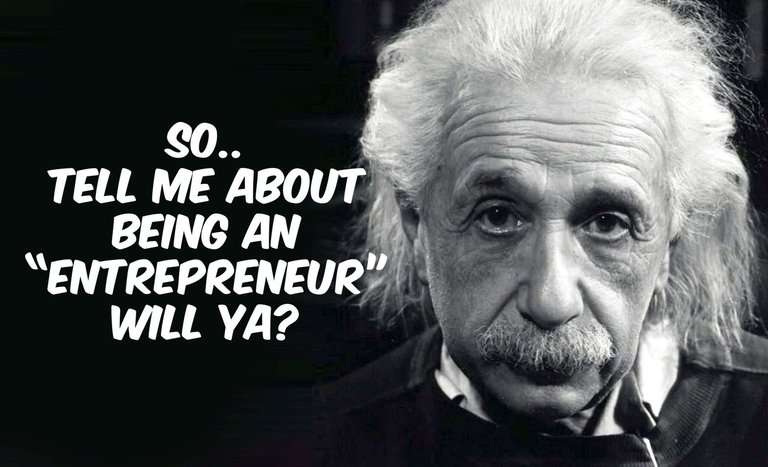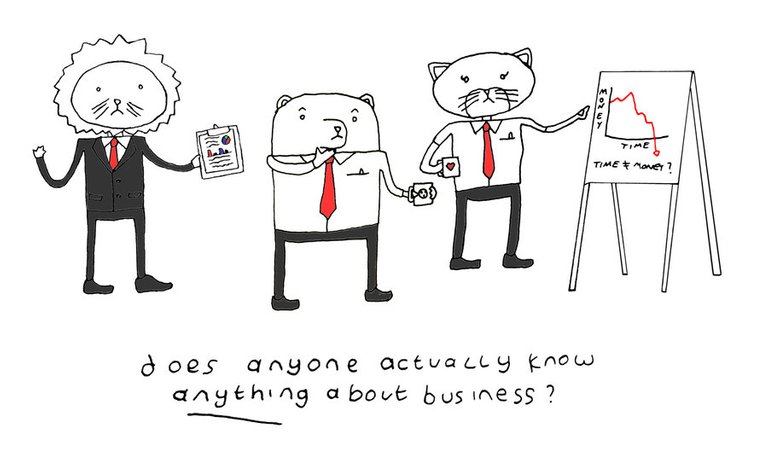
We’ve all seen it - hundreds and maybe thousands of ordinary people out there masking their true identities under the veil of entrepreneurship. The notion of serving the world, selling a 1 dollar product to 1 million people and retiring on a yacht is “life goals” for almost any ambitious millennial nowadays.

To make matters worst, a flock of delusional artists hopped on to the entrepreneurial landscape in a movement intended on proving that artists too can be entrepreneurs, or "artrepreneurs".
As a result, millions of hopefuls from both sides of the spectrum have taken an unjustified stand against employment and order, causing a trend of self-destructive entitlement while throwing the word 'entrepreneurship' around like confetti.
According to Inc.com, in 2015, 27 million entrepreneurs existed in the U.S. alone. According to Quora.com and various government websites, 400 million entrepreneurs existed around the world in 2016. Yet quite evidently, we do not see 400 million problems being solved across the globe. Today, it is no wonder that less than 5% of entrepreneurs actually succeed as entrepreneurs.
I'm sure that you can count a few people you know who fall under this category. To put numbers into perspective, if I had a bitcoin for every thousand delusional entrepreneurs out there, I would possess every bitcoin to ever exist - including Satoshi Nakamoto's bitcoin - and there would STILL be delusional entrepreneurs left running around in circles.


So what exactly does it mean to be a creative entrepreneur, and how can we be among the top 5% who find success? Let's start by covering some basics.
Origins
Origins Of "Entrepreneurship"
The word "entrepreneur" has been around since the 1850’s (as someone willing and able to convert a new idea into a successful innovation). "Entrepreneurship" was coined in 1920 by economist Jean-Baptiste Say.
Investopedia.org says:
❝An entrepreneur is an individual who, rather than working as an employee, runs a small business and assumes all the risks and rewards of a given business venture, idea, or good or service offered for sale.❞
Origins Of "Artrepreneurship"
The word "artrepreneur" has been around for centuries. Perhaps a more prominent reference of the word was by Jen Harvie, Professor of Contemporary Theatre and Performance, who published the word "artrepreneur" in a chapter title in her book “Fair Play”.
Two years later in April of 2015, Melissa Crum who holds a PhD, defined an artrepreneur as:
❝a resourceful person who merges his or her artistic skills and business expertise to establish a sustainable career.❞
About four months later on the blog Millenial Type, Declan Wilson, a creative entrepreneur who blogs mainly on Medium.com, defined an artrepreneur as:
❝anyone with a desire to better others through their art but still have the business savvy to make it a sustainable venture.❞


Now that we've covered the origins of entrepreneurship, let's go ahead and check through the list of my 16 commandments for success as an artrepreneur.
The 16 Commandments Of Artrepreneurship
The Artrepreneur Must:
- Have a business interest in at least one field of art; from drawing, to music, to cooking, to sports, etc.
- Actively volunteer to pursue educating oneself on the principles of business.
- Be able to adapt and live on a tremendously low income during darker days.
- Have an interest for human behaviour and a fascination by the psychology of why people buy.
- Work consistently on one's networking skills in order to foster a wider community.
- Be willing to take on multiple roles in order to build a strong foundation for one's brand or business.
- Be willing to work with multiple persons in order to capitalize on strengths and expand on weaknesses.
- Foster the ability to focus on one thing at a time keeping in mind that multi-tasking doesn't produce effective results.
- Set milestones and goals each month for personal and business improvement.
- Be able to translate inspiration into action - inspired ideas don't get results if not executed against.
- Have a burning desire to create and share one's creations for a living.
- Have a burning desire to help and give for a living.
- Develop constantly one's skills in sales, understanding that selling is about more than just products and services.
- Be comfortable with being uncomfortable, and be okay with taking calculated risks.
- Be fascinated by the beauty of things related to business, aesthetically and emotionally.
- Be able to listen carefully and accept feedback/criticism from the market and mentors.
And there you have it folks! May the Gods of Artrepreneurship bestow upon us tremendous success and sculpt us into the exceptional leaders and creative role models we strive to be. May we find joy and achievement in the gap where business and artistry intersect.

Which of the commandments do you feel you're a master at? Are there any you feel you should improve? Have I missed any important commandments that aspiring artrepreneurs can benefit from?
🎓 Please Comment your thoughts, and let's start a discussion!
🎖 Please Upvote If you've enjoyed today's post.
🔊 Please Resteem this post if you're a creative and would like to raise awareness about artrepreneurship.

Will you take a moment to read my introductory post and introduce yourself? Will be upvoting your introductions and following quality accounts.
References
On Entrepreneurship:
https://www.inc.com/leigh-buchanan/us-entrepreneurship-reaches-record-highs.html
https://www.quora.com/How-many-entrepreneurs-are-there-in-the-world
https://www.entrepreneur.com/article/238800
http://www.investopedia.com/ask/answers/08/origin-of-entrepreneur.asp
On Artrepreneurship:
https://artsandsciences.osu.edu/news/what-artrepreneur
http://www.artisancreative.com/artisan-blog/5-signs-you-are-an-artrepreneur
http://millennialtype.com/the-artrepreneur-when-art-and-entrepreneurship-meet-part-1/
Love this post. I've been dreaming about being an 'artreprenuer' (don't mind the quotes, it's still a new term for me.) I'm still, slowly and painfully, pulling my self out of the delusional mindset... with ways to go.
I recently had a conscious breakthrough while taking a long walk. It's a simple idea i've ingested before, but never digested, and that is concerning the sacredness of work. Any work.
A series of painfully humbling jobs in recent months, combined with a long walk to reflect upon them...
...and then stopping to watch some honey bees at work, all contributed to cementing this idea in my head that work is absolutely sacred. Sweeping, watering plants, managing your business, practicing your art, teaching others, and wiping boogers from a child's face... All of these activities contribute to a more fully realized human experience... not just your art.
Thanks for the post!
Thanks for your thorough comment Mich! From what I'm seeing on your account you're definitely on the right track! :)
I think you're on to something with your discussion about sacred work. In the end, the reason why people (should) work is to survive and be fulfilled. As long as you find what you love doing, and you're willing to master doing what you love, there will ALWAYS be ways to turn what you love into business.
What you love often can't sustain being a legit business. This is where it's important to find people who are strong in things you're weak at, so you can focus on the things you're strong at.
And then the rocket takes off.
Hope that made sense! I'm happy to connect :)
So I wouldn't say master... but # 11 seems to be the one for me. The rest are as ever and just like the art itself, a work in progress ;)
How about you? How many of these Art Scout Badges have you earned so far?
That's cool! Thanks for letting me know. Would you say you're interested in pursuing entrepreneurship? You know, you can focus on your strengths and team up with people who will compensate your weaknesses :) You definitely are very talented.
Loved the Art Scout Badges name 😄😄 I'm actually lacking in 13 and 10, HORRIBLE at 8!! I'm constantly bombarded by my own ideas, I wish I could have that laser sharp focus..